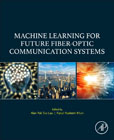
Machine Learning for Future Fiber-Optic Communication Systems
Lau, Alan Pak Tao
Khan, Faisal Nadeem
Machine Learning for Future Fiber-Optic Communication Systems provides a comprehensive and in-depth treatment of machine learning concepts and techniques applied to key areas within optical communications and networking, reflecting the state-of-the-art research and industrial practices. The book gives knowledge and insights into the role machine learning-based mechanisms will soon play in the future realization of intelligent optical network infrastructures that can manage and monitor themselves, diagnose and resolve problems, and provide intelligent and efficient services to the end users. With up-to-date coverage and extensive treatment of various important topics related to machine learning for fiber-optic communication systems, this book is an invaluable reference for photonics researchers and engineers. It is also a very suitable text for graduate students interested in ML-based signal processing and networking. Discusses the reasons behind the recent popularity of machine learning (ML) concepts in modern optical communication networks and the why/where/how ML can play a unique role Presents fundamental ML techniques like artificial neural networks (ANNs), support vector machines (SVMs), K-means clustering, expectation-maximization (EM) algorithm, principal component analysis (PCA), independent component analysis (ICA), reinforcement learning, and more Covers advanced deep learning (DL) methods such as deep neural networks (DNNs), convolutional neural networks (CNNs), recurrent neural networks (RNNs), and generative adversarial networks (GANs) Individual chapters focus on ML applications in key areas of optical communications and networking INDICE: 1. Background introduction of ML techniques for optical communications 2. ML techniques for long-haul systems3. ML techniques for IM/DD systems 4. ML techniques for passive optical networks5. ML for end-to-end learning of complete fiber-optic communication system6. ML methods for QoT estimation and optical performance monitoring7. ML-based adaptive network resources allocation, control and management8. ML-assisted cognitive network fault protection and management 9. ML for cross-layer optimizations and automated network operation in SDNs10. ML for network security management, and attacks and intrusions detection 11. ML for low-margin optical networking12. ML for quantum optical communication systems 13. ML for intelligent testing and measurement equipment14. ML for design and optimization of photonic devices and sub-systems15. ML for channel coding
- ISBN: 978-0-323-85227-2
- Editorial: Academic Press
- Encuadernacion: Rústica
- Páginas: 402
- Fecha Publicación: 15/02/2022
- Nº Volúmenes: 1
- Idioma: Inglés
